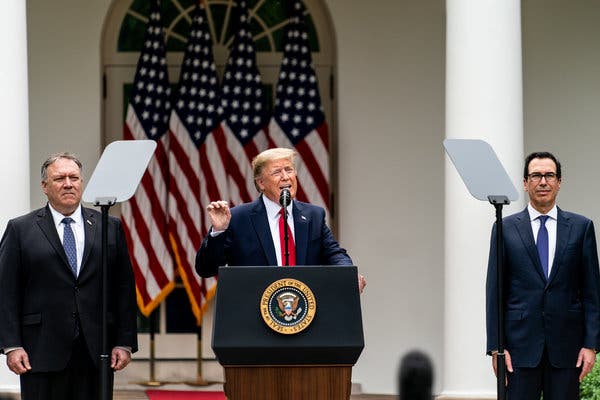Advertisement
The new leader of the Working Families Party in New York hopes to remake the progressive group to attract the energized left.

The Working Families Party, an influential, labor-backed organization that has helped push Democrats to the left, is moving toward a new identity: It wants to align itself with the movement that spawned Representative Alexandria Ocasio-Cortez.
The shift comes amid recent internal debate between the labor unions that helped found the W.F.P. in the late 1990s and the party’s more progressive faction — fissures that have caused key unions to withdraw their support for the party in New York.
Rather than try to repair those relationships, party leaders are moving further to the left, seeking to strengthen its alliance with groups like the Democratic Socialists of America, an early backer of Ms. Ocasio-Cortez’s congressional campaign in 2018.
“There are social movement actors from Occupy Wall Street all the way to the resistance movement to Trump, who are looking for an electoral political home,” said Maurice Mitchell, the W.F.P.’s national director. “The next iteration of the Working Families Party is intent on being that political home.”
Leading that shift in New York will be Sochie Nnaemeka, whose appointment as the head of the New York State Working Families Party will be announced on Saturday.
Ms. Nnaemeka, 31, an activist who most recently served as the director of emerging organizing and leadership at the Center for Popular Democracy, will assume her role at a time of great success but also looming trouble.
In 2018, the W.F.P. helped knock out members of the Independent Democratic Conference — a group of Democratic state senators who had collaborated with Republicans — and elect more progressives to the New York Senate. That returned control of the body to Democrats and led to the passage of long-stalled progressive priorities like changes to rent and bail laws.
But the W.F.P.’s push to the left seems to have caused other problems for itself. In 2014, the party flirted with not granting its line to Gov. Andrew M. Cuomo because party members did not feel he was progressive enough. In 2018, the W.F.P. endorsed Mr. Cuomo’s primary rival, the actress and activist Cynthia Nixon; after her primary defeat, the party gave Mr. Cuomo its ballot line.
Now, a commission created by Mr. Cuomo and state leaders has voted to raise the threshold for minor parties to make the ballot. The W.F.P. and another third party have filed a lawsuit and accused the governor of trying to destroy them, a charge Mr. Cuomo has waved off.
“Damaging the W.F.P. is small potatoes when you consider the much broader movement being built,” said Jonathan Westin, director of New York Communities for Change, a grass-roots organizing group. “There is a growing anger on the left about where we need to be going and that the Democratic Party has not gone there.”
Ms. Nnaemeka seemed confident of the party’s future.
“There are new formations that are aligning. The D.S.A. is growing, and there are all sorts of other insurgent left groups that we are in a deep relationship with,” she said in an interview, referring to the Democratic Socialists of America.
“We were still on an upward trajectory,” she added. “We still delivered on progressive visions even as our party changed shape.”
Bill Lipton, whom Ms. Nnaemeka is replacing, said he would be involved with the state party through the 2020 election, then work on climate issues for the national party.
The W.F.P. and the D.S.A. may not agree on everything. The W.F.P., for example, has endorsed Senator Elizabeth Warren in the Democratic presidential primary; the Democratic Socialists have endorsed Senator Bernie Sanders.
“The endorsement of Elizabeth Warren is not a choice we would have made, but everyone knows that beating Trump requires a coalition,” said Cea Weaver, a member of a D.S.A. steering committee in New York City. “We help each other be more left versions of ourselves.”
The partnership nearly scored a monumental upset in this year’s Democratic primary for Queens district attorney, which was ultimately won by Melinda Katz, the candidate backed by the Democratic county machine.
Tiffany Cabán was a little-known public defender when she picked up the endorsement of the D.S.A. for her bid for the Democratic nod. The W.F.P. soon came on board.
“W.F.P. had the strategy and the know-how and we combined that with what D.S.A. does best, which is boots-on-the-ground organizing,” Ms. Cabán said.
After a lengthy recount, Ms. Cabán lost the Democratic primary by about 60 votes to Ms. Katz, who went on to win the general election last month.
The D.S.A. is currently backing a slate of candidates in Brooklyn to challenge several incumbents, including state Assembly members Erik Martin Dilan, Félix Ortiz and Walter Mosley, and Senator Velmanette Montgomery.
“We’d love to be able to replicate that Tiffany Cabán model,” Ms. Weaver said. The W.F.P. has not made a decision about endorsements in those races.
But the burgeoning partnership may help fuel a perception that progressive groups are made up of mainly white, middle-class people who are pitting their views against more established groups of people of color.
“Historically, the W.F.P. has this reputation of being the white progressives, and the white progressives who get on my nerves,” said L. Joy Williams, a political strategist and president of the Brooklyn N.A.A.C.P. who worked with Ms. Nixon during her primary run. “This tension is prevalent in places like Brooklyn, where we have these pockets of white progressives.”
Membership in the D.S.A. has jumped to 50,000 from 5,000 after the election of President Trump, and the group has acknowledged that it needs to diversify its ranks.
“We’ve always had to deal with the paternalism that exists and that’s not absent in the white, progressive circles,” said Jumaane D. Williams, the New York City public advocate who was supported by the W.F.P. and D.S.A. during his run for lieutenant governor, and is a member of the D.S.A. “The W.F.P. didn’t always represent the communities they organized, and they changed that. D.S.A. can do the same.”
Emma Wolfe, chief of staff to Mayor Bill de Blasio, said Ms. Nnaemeka’s background as a black woman who is the daughter of immigrants was a signal that groups like the W.F.P. and D.S.A. were listening to the criticism.
“The progressive left is a multiracial coalition,” Ms. Nnaemeka said. “Blacks are progressive. I’m a black person who considers herself part of a strong progressive left who wants to expand possibilities for working-class people.”


